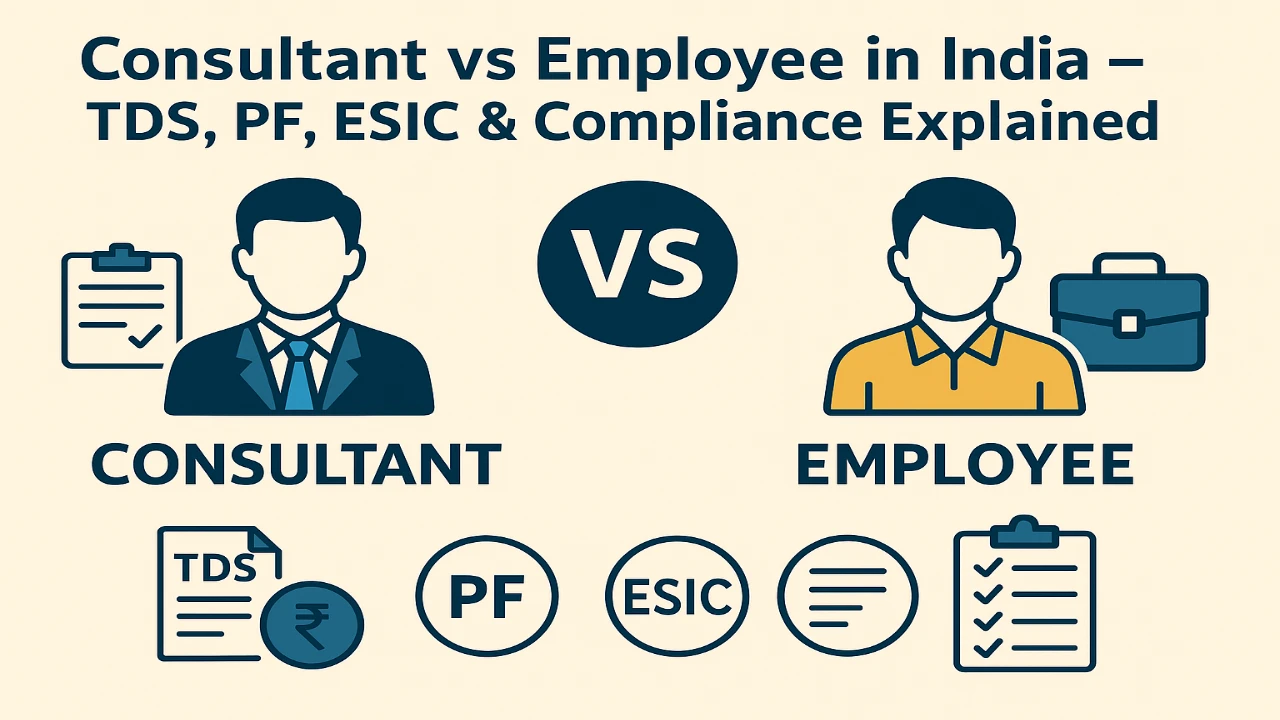In today’s changing work environment, many individuals are hired not as employees but as consultants or freelancers. While the job roles may seem similar on the surface, the implications are drastically different, especially when it comes to TDS (Tax Deducted at Source), EPF/ESIC, and overall legal compliance.
If you have ever seen someone earning ₹10,000 but having ₹1,000 deducted as TDS, it’s likely they were hired as a consultant under Section 194J, not as a regular employee.
In this article, we will break it down in simple terms to help you understand how employers treat “consultants” and “employees” differently and what you should be aware of, both as a professional and an employer.
1. Who is an Employee?
An employee is a person who:
- Works under a formal employment contract,
- Is on the company’s payroll,
- Receives a fixed salary,
- Has specific working hours and reporting structure,
- Is eligible for benefits like EPF, ESIC, Gratuity, Bonus, etc.
TDS Treatment:
- TDS is deducted under Section 192 of the Income Tax Act.
- The rate is not fixed – it depends on the employee’s income tax slab.
- Employees receive Form 16 for income tax filing.
2. Who is a Consultant?
A consultant is an independent professional hired to provide advisory, technical, or specialised services for a fee. They:
- Are not on payroll,
- Often work on a project or deliverable basis,
- Do not receive EPF, ESIC, or Gratuity,
- May work for multiple clients.
TDS Treatment (Updated from 1st April 2025):
- TDS is deducted under Section 194J of the Income Tax Act.
- TDS is flat 10% if the payment exceeds ₹50,000 in a financial year.
- If PAN is not provided, TDS is 20% as per Section 206AA.
- Consultants receive Form 16A, not Form 16, for TDS deduction.
💡 Example:
Suppose a consultant earns ₹1,20,000 in a financial year:
- Since the payment exceeds ₹50,000, TDS is applicable on the full ₹1,20,000, not just the excess.
- TDS @10% = ₹12,000
- The consultant will receive ₹1,08,000 after TDS deduction.
🔸 Remember, ₹50,000 is only a threshold, not an exemption.
3. Key Differences Between Consultant and Employee
| Point of Comparison | Employee | Consultant |
|---|---|---|
| Legal Relationship | Employer–Employee | Principal–Consultant |
| TDS Section | Section 192 | Section 194J |
| TDS Rate | As per income tax slab | 10% (flat) if annual payment > ₹50,000 |
| PF/ESIC/Gratuity | Applicable | Not Applicable |
| Working Hours | Fixed, as per company | Flexible |
| Income Tax Form | Form 16 | Form 16A |
| Leave & Holidays | Usually paid leaves & holidays | No paid leave or holidays |
| Job Security | Higher | Depends on contract |
4. Why Do Companies Prefer Hiring Consultants?
Companies often hire consultants to:
- Avoid long-term obligations (like PF, gratuity),
- Get specialised expertise temporarily,
- Save on compliance costs,
- Have more flexibility in managing manpower.
✅ This is legal only if the person is truly working as an independent professional.
❌ But if the consultant is actually working full-time like an employee, the company could face penalties from labour authorities for:
- Avoiding PF/ESIC contributions,
- Misclassifying the relationship to save TDS or admin cost.
5. What Employees and Consultants Should Be Aware Of
For Individuals:
- If you are working full-time like an employee but receiving money as a consultant, you might lose:
- PF, ESIC, bonus, and gratuity benefits,
- Job security,
- Tax slab benefits (you will pay 10% TDS even if your income is below the taxable limit).
- File your ITR correctly – claim a refund if excess TDS is deducted.
For Employers:
- Don’t misuse the “consultant” tag to avoid compliance.
- Labour inspectors and PF departments do conduct audits.
- Wrong classification can lead to:
- Backdated PF/ESIC demand,
- Penalties,
- Legal complications.
6. Real-Life Example
Suppose a person is earning ₹10,000 per month.
- If he is an employee, no TDS is applicable as the income is below taxable limit.
- If he is a consultant, TDS @ 10% = ₹1,000 will be deducted even if total income is ₹1,20,000 per year — which is below the taxable threshold!
That’s why classification matters — both for fairness and legal compliance.
Final Thoughts
In India, the difference between an employee and a consultant is not just about title — it affects tax, compliance, and worker rights.
✅ If you are an employee, know your rights.
✅ If you are a consultant, keep track of your TDS and income.
✅ If you are an employer, ensure you are classifying workers correctly.
Misclassification can hurt everyone, financially and legally.
Check out More Helpful Articles :



